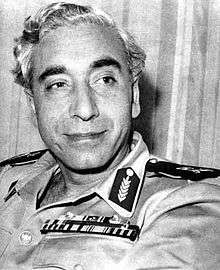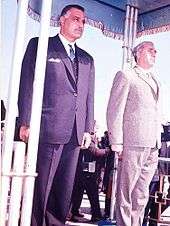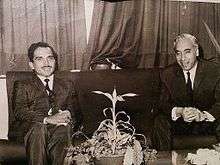Amin al-Hafiz
| Amin Al-Hafiz أمين الحافظ | |
|---|---|
 | |
| Regional Secretary of the Regional Command of the Syrian Regional Branch | |
|
In office 4 October 1964 – 19 December 1965 | |
| Secretary General |
Michel Aflaq Munif al-Razzaz |
| Preceded by | Shibli al-Aysami |
| Succeeded by |
Nureddin al-Atassi (Regional Command dissolved in December 1965, new Regional Secretary elected in March 1966) |
| President of Syria | |
|
In office 27 July 1963 – 23 February 1966 | |
| Preceded by | Lu'ay al-Atassi |
| Succeeded by | Nureddin al-Atassi |
| Prime Minister of Syria | |
|
In office 4 October 1964 – 23 September 1965 | |
| Preceded by | Salah al-Din Bitar |
| Succeeded by | Yusuf Zu'ayyin |
|
In office 12 November 1963 – 13 May 1964 | |
| Preceded by | Salah al-Din Bitar |
| Succeeded by | Salah al-Din Bitar |
| Member of the National Command of the Arab Socialist Ba'ath Party | |
|
In office 23 October 1963 – 23 February 1966 | |
| Member of the Regional Command of the Syrian Regional Branch | |
|
In office 1 February 1964 – 19 December 1965 | |
| Personal details | |
| Born |
1918 Aleppo, Syria |
| Died |
December 17, 2009 (aged 91) Aleppo, Syria |
| Political party | Syrian Regional Branch of the Arab Socialist Ba'ath Party |
| Spouse(s) | Zeinab al-Hafiz |
| Religion | Sunni Islam |
| Amin al-Hafiz أمين الحافظ | |
|---|---|
| Born | 1918 |
| Died | December 17, 2009 (aged 91) |
| Allegiance |
|
| Service/branch | Syrian Arab Army |
| Years of service | 1938-1966 |
| Rank |
|
Amin al-Hafiz (or Hafez; 1921 – 17 December 2009)[1] (Arabic: أمين الحافظ) was a Syrian politician, General and member of the Ba'ath Party.
Career
Early life
Al-Hafiz was born in the city of Aleppo.
His first main political role was in 1958, as a Brigadier and leader of a Syrian Army delegation that visited Gamal Abdel Nasser, the Egyptian president. The two states duly merged into one United Arab Republic in February that year, and al-Hafiz was posted to Cairo. The union crumbled after a Syrian uprising in September 1961, and the resultant secessionist government banished, al-Hafiz was sent to Argentina, as Syria's military attaché.[2]
Rise to power

The 1963 Syrian coup d'état led by the Military Committee introduced Hafiz to public life. In the aftermath of the coup the National Council of the Revolutionary Command (NCRC) became the country's supreme organ. The NCRC was dominated by the Syrian branch of the radical, pan-Arab Ba'ath Party. Hafiz became President, instituted socialist reforms and oriented his country towards the Eastern Bloc.

Eli Cohen affair
The details of Eli Cohen and his covert operations are impossible to verify, and his importance maybe exaggerated by Israeli historians. In any case Al-Hafiz himself rebutted and denied the allegations of his stature within the Syrian military or political sphere.[3] Allegedly, during his exile in Buenos Aires, Hafez befriended a supposed Lebanese trader named Kamal Amin Thaabet, an allegation which he flatly denied. According to Hafez, he never met Cohen in Argentina. His account was that Cohen was a socialite who befriended officers in the Syrian Army but was never a part of the military in any official capacity. Generally, the importance of the intelligence provided to the Israelis was greatly exaggerated.[4] Thaabet was actually an Egyptian-born Israeli Mossad agent, Eli Cohen. Thaabet/Cohen arrived in Syria in early 1962, a year before Hafez’s return, and soon began passing information about Syrian military plans to Israel.[2]
As president, Hafez groomed Thaabet/Cohen to be a future defence minister and possibly even his successor, an allegation which he also flatly denied and challenged.[4] Hafez invited Thaabet/Cohen to functions and gave him tours of secret fortifications in the Golan Heights. When Cohen was revealed as a spy in January 1965, Hafez personally interrogated him and ordered the arrest of 500 of his highly placed friends. Despite international pleas for clemency, Hafez had Cohen publicly hanged in Damascus.[2]
Downfall
On 23 February 1966, he was overthrown by a radical Ba'athist faction headed by Chief of Staff Salah Jadid.[5][6] A late warning telegram of the coup d'état was sent from President Nasser to Nasim al-Safarjalani (The General Secretary of Presidential Council), on the early morning of the coup d'état. The coup sprung out of factional rivalry between Jadid's "regionalist" (qutri) camp of the Ba'ath Party, which promoted ambitions for a Greater Syria and the more traditionally pan-Arab Hafiz faction, called the "nationalist" (qawmi) faction. Jadid's supporters were also seen as more radically left-wing.[7] But the coup was also supported and led by officers from Syria's religious minorities, especially the Alawite Muslims and the Druze, whereas Hafiz belonged to the majority Sunni population. Alawis have ruled Syria ever since.
Exile and return
After being wounded in the three-hour shootout that preceded the coup, in which two of his own children were seriously wounded, Hafez was jailed in Damascus's Mezzeh prison before being sent to Lebanon in June 1967. A year later he was relocated to Baghdad. In 1971, the courts of Damascus sentenced him to death in absentia, however Saddam Hussein "treated him and his fellow exile, Ba'ath founder Michel Aflaq, like royalty" and the sentence was not carried out.[8] After the fall of Saddam in the Iraq War of 2003, al-Hafiz was quietly allowed to return to Syria.[9] He died in Aleppo on December 17, 2009; reports of his age differ, but he was believed to be in his late 80's.[1][10] He received a state sponsored funeral.[8]
References
- 1 2 Syria-news (Arabic)
- 1 2 3 Joffe, Lawrence (16 February 2010). "Amin al-Hafez obituary". The Guardian. London.
- ↑ "شاهد على العصر". YouTube. Retrieved 2014-12-14.
- 1 2 Al Jazeera Interview. "Shahid Al Asr" 2001.
- ↑ Associated Press (16 February 2010). "Amin al-Hafez obituary". London: The Guardian. Retrieved 31 May 2012.
- ↑ Associated Press (August 24, 1993). "Salah Jadid, 63, Leader of Syria Deposed and Imprisoned by Assad". The New York Times. Retrieved 31 May 2012.
- ↑ "Syria:Coups and Countercoups, 1961-70". http://countrystudies.us/. Retrieved 31 May 2012. External link in
|publisher=(help) - 1 2 Joffe, Lawrence (16 February 2010). "Amin al-Hafez obituary: Leader of Syria's first Ba'athist regime". London: The Guardian. Retrieved 31 May 2012.
- ↑ Anthony Shadid (May 18, 2005). "Syria Heralds Reforms, But Many Have Doubts". The Washington Post. Retrieved 31 May 2012.
- ↑ AGENCE FRANCE-PRESSE (December 18, 2009). "Amin el-Hafez, Baathist Leader of Syria in 1960s, Dies". The New York Times. Retrieved 31 May 2012.